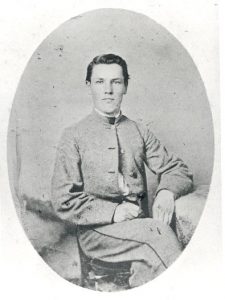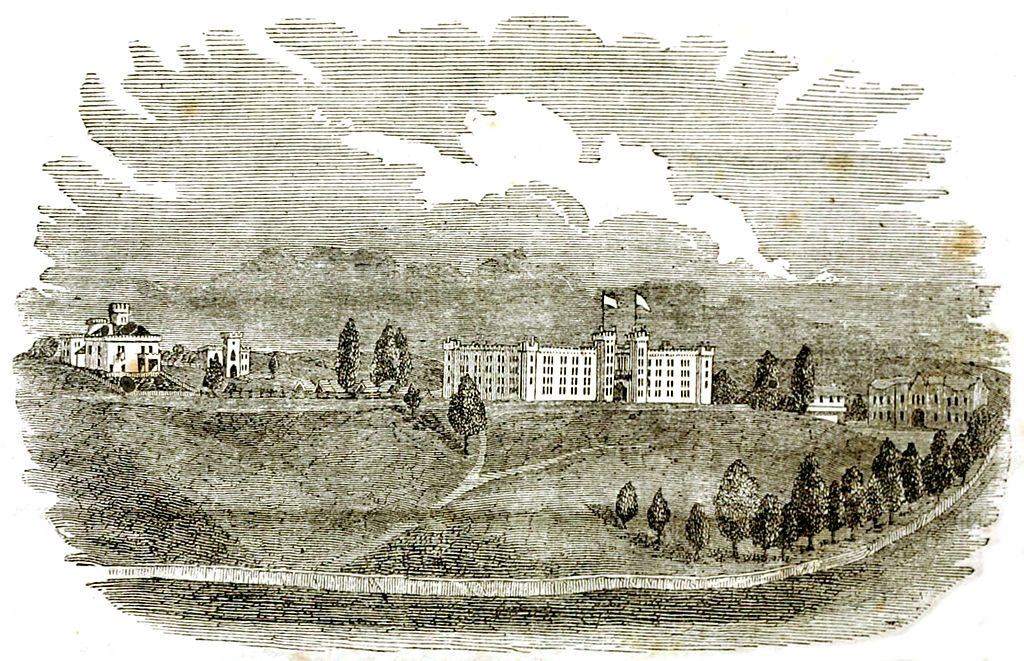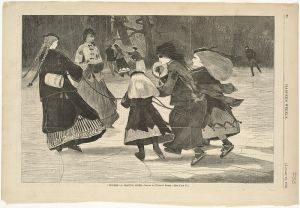A VMI Cadet Goes Ice-Skating

On the evening of March 22, 1864, eighteen-year-old Beverly “Jack” Stanard huddled in his cold barracks room at Virginia Military Institute, writing to his mother. That particular evening he found plenty to complain about:
…Well, Mother I guess you will wonder why it is, that I am writing with a lead pencil. The reason is just this, we are upon the eve of freezing up. It has been one week since we had a particle of heat. (There not being a stick of wood at the V.M.I.) You know what a change has taken place in the weather – today it is snowing hard, and a cold wind blowing, and still we are having the same duties to attend to, both academic & military. It is outrageous, for the boys can’t study a bit…[i]
Ironically, just weeks before, this same cadet had expressed his enthusiasm for cold weather and winter sports. During winter break and a free Saturday, he had enjoyed venturing into the freezing air to go ice-skating, leaving readers (and maybe his mother) to wonder if the complaints were genuine or a series of excuses for his lack of interest in studying. A frequent plea throughout Cadet Stanard’s letters echoed a desire to leave the safety of Virginia Military Institute and join the Confederate army. Yet, understandably, his widowed mother wanted to keep her youngest son out of the conflict and away from battlefields. Reluctantly, she had enrolled him at the military school in Lexington, Virginia, hoping to further his education and prevent him from enlisting.
Interspersed with Cadet Stanard’s observations, humorous stories, requests for money, and arguments to enlist, some accounts of ice skating in the winter months appeared, illustrative of the popularity of this sport during the Civil War era.

At first the frozen river seems tragic to this teen and his friends who would be deprived of their food boxes from home, due to the forming ice. His reports on the Maury’s River conditions began on January 3, 1864:
I had looked forward before Xmas with much pleasure to the arrival of two boxes belonging to my roommates which were to have come by the packet boat but it has not as yet made its appearance. And judging from the looks of the river which I can plainly see from my window, and which is entirely frozen over, that it will not do so for some time to come…[ii]

Then two weeks passed before he wrote to Mother again:
It has been so long since I wrote that I guess you have been uneasy about me again, thinking I might be sick – Quite to the contrary, for the last week have been having a good time skating. The river was frozen over beautifully for miles, as we were not doing any studying, the Examination being just over, we were all allowed to go. I wish you could have seen the river[.] It looked like a flock of black birds was on it. I never saw boys seem to enjoy themselves more, could play bandy, fox & goose and many other games, to afford us amusement. Sandy P & Sisters & some other ladies were down to see us. Sandy seemed to be a very awkward skater, and would get some pretty falls, sometimes, which added to my fun. I think he is Stuck up quite much. I hav’nt spoke to him yet. [iii]
While reporting on his “good time,” Cadet Stanard also shared some hints to the social aspect of ice-skating, noting some of the town civilians came to watch and participate. Certainly, it created a scene less formal (and probably a little more wild) than skating in New York Central Park, and it also gave Cadet Stanard a chance to laugh at a local war hero. Research reveals Sandy P’s identity; during January 1864 Major Alexander “Sandie” Pendleton, a staff officer in the Army of Northern Virginia’s Second Corps and the son of General William N. Pendleton, visited his family in Lexington as a destination on his wedding tour (honeymoon).[iv] Unimpressed with the officer, Cadet Stanard delightedly observed him slipping and crashing on the ice.
Happily for the Virginia Military Institute cadets, the Maury River froze again in February, offering an opportunity for winter fun and a little flirtation with the girls:
Since my last letter nothing much of interest has transpired to disturb the monotony of the V.M.I soldier boy’s life – or daily routine of exercises, save the freezing up of the river, which has afforded us a little fun skating. Yesterday being Saturday, it did not interfere with our duties or studies, so all could go that wished. I went down to the river in the morning myself, ‘though not with the intention of skating, as I had a sore back and then I was minus a pair of skates, mine being broken, but the ice was so beautiful that I could not resist the temptation, so borrowed a pair from one of the boys – and spent the rest of the morning on the ice. It was really elegant fun, could go down the river as far as you wished. There were a great many ladies on the ice, who seemed evidently to think there was more fun in falling down than standing up, but unfortunately in the hight [height] of their enjoyment, one of them (frisky) fell rather too hard and almost broke her nose. Poor girl, I guess it will spoil her beauty spot and I know will teach her a lesson how to run on ice again. The fall of this unfortunate lady, of course, intimidated and some what marred the pleasure of the remainder of the party. My friend Miss LP was among the no. [number] and was looking as rosy as usual.[v]
What better way to get attention than tumbling on the ice to look helpless and possibly enlist the sympathy or aid of some handsome teens? At least that seems to be the tactic employed by these young ladies of Lexington. Although Cadet Stanard did not seem impressed with the girls’ lack of skating skills, he enjoyed watching at his particular friend, Miss Hughella “Lella” Pendleton, one of Major Pendleton’s sisters. From other letters, it seems Miss Pendleton was Cadet Stanard’s crush, but it’s not clear if he ever said anything or if she was even aware of his interest.

Though ice-skating provided a pleasant reason to weather the winter cold and reduced the monotony of classes and exercises, the fun couldn’t last forever. As the ice melted, the ground thawed, and spring rains began, Cadet Standard impatiently wrote to his sister:
Do you not candidly think I ought to be in the Army[?] I am over 18. I think I have been very obedient in remaining here as long as I have, and only done so because I hated to go contrary to the wish of a fond and devoted Mother. I think Mother might very willingly give consent now, that the prospect of the war ending soon is very great…[vi]
He would not receive the opportunity to enlist. On May 10, 1864, the Corps of Cadets received orders to join General John C. Breckinridge as a reserve unit to defend the Shenandoah Valley from General Franz Sigel and his Union columns. Five days later, at the Battle of New Market, the Virginia Military Institute Cadets entered combat. After the battle, Cadet Stanard’s young comrades found him near the Bushong House.“We had come too late. Stanard had breathed his last but a few moments before… Poor Jack – playmate, room-mate, friend – farewell!”[vii]
And yet, on those freezing winter days of ’64, as the boy’s skates glided forward on the ice it was an exhilarating carefree moment. The war – even thoughts of it – seemed far away as he poked fun at a “stuck up” officer. The thought of battlefield death probably never crossed his mind as he spied on the girls and complained to home about the cold conditions for studying. However, after the ice cracked and conflict returned to The Valley, these moments of fun came to an end. The boy grappled with the reality of battle, finding courage to move forward into combat, alongside the friends who had “never enjoyed themselves more” than on the frozen Maury River, shadowed by the castle-like walls of Virginia Military Institute.
[i] Standard, B., edited by J.G. Barrett and R.K. Turner, Jr. Letters of a New Market Cadet, University of North Carolina Press, Chapel Hill, North Carolina, 1961. Letter: March 22, 1864 (page 46)
[ii] Ibid, Letter: January 3, 1864 (pages 28-29)
[iii] Ibid, Letter: January 17, 1864 –date is possibly wrong according to the footnotes in the book (pages 31-32)
[iv] Bean, W.G. Stonewall’s Man: Sandie Pendleton, University of North Carolina Press, Chapel Hill, North Carolina, 1959, pages 182-186.
[v] Stanard, B., edited by J.G. Barrett and R.K. Turner, Jr. Letters of a New Market Cadet, University of North Carolina Press, Chapel Hill, North Carolina, 1961. Letter: February 21, 1864, (pages 40-41)
[vi] Ibid, Letter: April 8, 1864 (page 50)
[vii] Knight, C.R, Valley Thunder: The Battle of New Market, Savas Beatie, 2010, page 221.

Tragic story of a young life .
Very interesting piece. I wonder of Stanard ever played what we in the hockey planet call “shinny”.